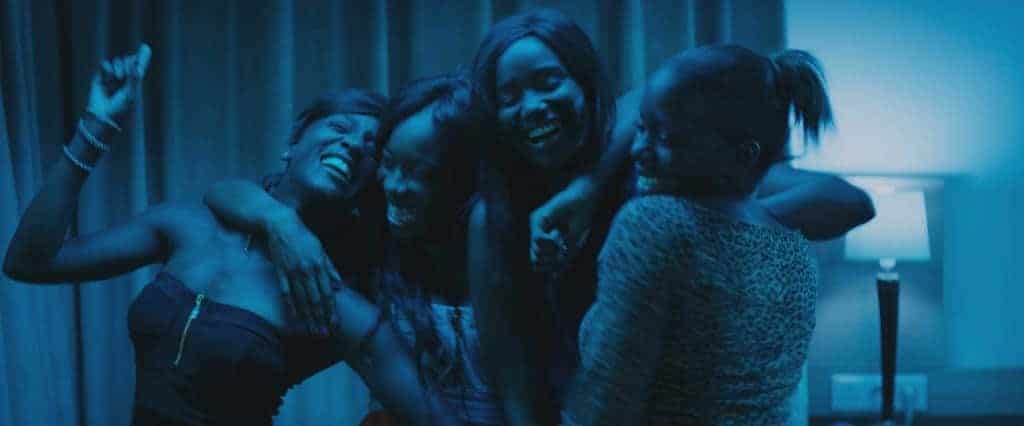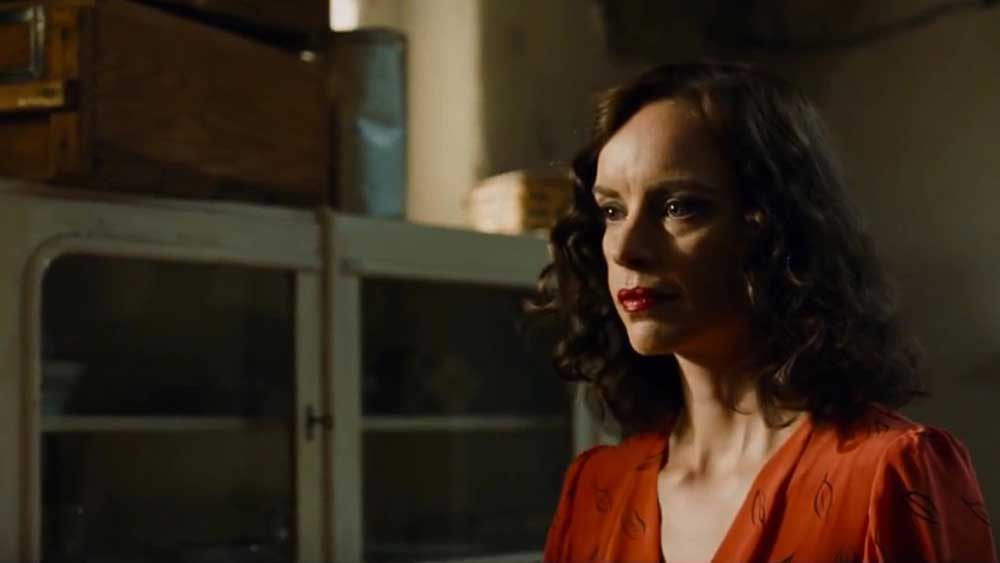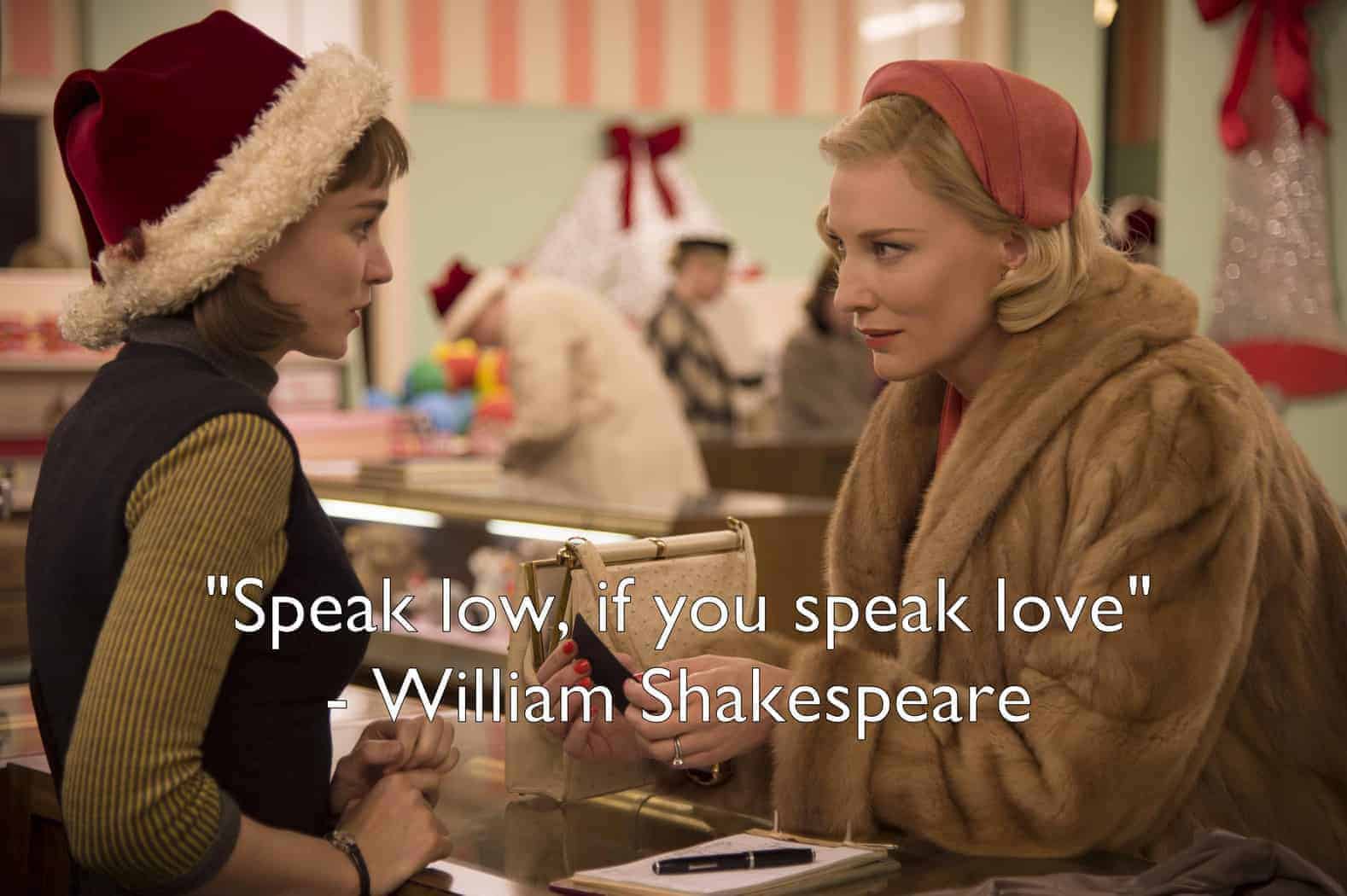
Kicking off our series of the best music in film in 2015, here’s our list of the best use of music — be it scores or diegetic songs — in film. All of these musical choices are crucial to the film’s narrative, often forming a key emotional moment.

Instrumental versions of Kurt Weill’s “Speak Low” haunt the soundscape of Christian Petzold’s Phoenix. So when former cabaret singer Nelly (Nina Hoss) takes the stage to sing it at the end of the film, we’ve been primed for this devastating performance. Having survived the concentration camps during the war, Nelly returned to Berlin to find her husband who may have turned her in and who no longer recognizes her. But he thinks she resembles his wife enough to recruit her for a scheme that requires Nelly to impersonate herself. In the process, he effectively teaches her how to be her former self, which is both therapeutic and a reminder of all she’s lost. This song is a cathartic outburst of emotion. Nelly finally lets out everything she’s been keeping in, aware that it will make those around her uncomfortable even though it’s necessary for her to be able to move on. It’s the climax of the film, which ends in a literal mic drop.
Available to watch on Netflix and iTunes.
2. Girlhood – “Diamonds” by Rihanna
Rihanna’s “Diamonds” scores the highlight of an excellent film, a two-minute scene that finds Miriame letting loose with her friends while dancing to this song. Miriame has been denied the chance to pursue the academic career she’d hoped for, forced to cope on a day-to-day basis with her abusive brother, and had to suffer through many more trials and tribulations. She’s been making choices to try to emancipate herself, but so many of them end up backing her into her corner. But Miriame is a fighter, and her tight-knit group of female friends is crucial for what keeps her going. Bathed in blue light, the girls sparkle and shine in this rare moment of total freedom and joy. It’s not just a scene with dancing as liberation, but a narrative piece, showing Miriame finding solace in her group of friends.
We talked to director Céline Sciamma about crafting this scene here.
[youtube https://www.youtube.com/watch?v=NsBRg2fs_3U&w=560&h=315]
Available to watch on Netflix, iTunes, and DVD.
3. Magic Mike XXL – “Pony” by Ginuwine
When Magic Mike XXL opens, Mike has left the stripping business to become a fledgling entrepreneurial carpenter. But when his signature song, Ginuwine’s “Pony,” starts playing on the radio while he’s working one night, he can’t help but start dancing. It’s the single greatest scene in the film, a reminder that not only can Channing Tatum dance, but he knows how to perform. Shot by Peter Andrews in a series of long, uncut takes, this is two minutes of pure joy. It’s enough to whet your appetite for an old-fashioned musical starring Channing Tatum — the Coen brothers are almost obliging.
[youtube https://www.youtube.com/watch?v=9FoM9JHXCWQ&w=560&h=315]
Available to watch on iTunes.
4. White God – Liszt’s Hungarian Rhapsody

White God is set in a dystopian world not that different from Budapest today, where mixed breed dogs are treated like vermin, forced to live on the street when not being used and abused by people. But when one dog, Hagen, who’s known both love and abuse, snaps, he ends up leading an uprising against his human oppressors. Perhaps Liszt’s most famous work, Hungarian Rhapsody, bookends White God. Lili plays it with her orchestra at the beginning and it’s the soundtrack to the dog uprising toward the end. It’s a triumphant, revolutionary piece of music that comes alive as the soundtrack to the rebellion.
We talked to director Kornél Mundruczó about why he chose this piece and how the dog rebellion gives it new meaning.
Available to watch on Netflix and iTunes.
5. Far from the Madding Crowd – “Let No Man Steal Your Thyme” sung by Carey Mulligan and Michael Sheen

At a celebratory dinner, Bathsheba’s (Carey Mulligan) staff persuades her to perform “Let no man steal your thyme” for them. Director Thomas Vinterberg crafts this into a crucial scene in which Bathsheba’s allegiances subtly shift from her subordinate and one-time sweetheart, Gabriel Oak (Matthias Schoenaerts), to her neighbour and equal in station, Mr. Boldwood (Michael Sheen). Bathsheba begins singing the song on her own, sharing glances with Gabriel Oak. Earlier that evening, Gabriel had been seated at the head of the table. But when Mr. Boldwood arrived, he usurped Gabriel’s place. Now seated in the middle of the table, Gabriel is physically caught between Mr. Boldwood and Bathsheba at the piano at the other end of the table. As Mr. Boldwood unexpectedly joins in for a duet, we watched Gabriel fade into the background as his hopes for change are dashed. It’s a beautiful piece of staging, and Sheen and Mulligan make great singing partners.
Read our review of the film here.
Available to watch on iTunes.
6. Felix and Meira – “After Laughter” by Wendy Rene
Wendy Rene’s “After Laughter” is the song of choice for Meira (Hadas Yaron), a Hasidic woman trapped in a constricted life over which she has little control. Although listening to records is forbidden, Meira puts on this tune whenever her husband leaves the house. It’s her one refuge. The song appears multiple times in the film, taking on more meaning each time.
We talked to writer-director Maxime Giroux about how he chose the song for the film.
Available to watch on Amazon Prime and iTunes.
7. Arabian Nights – “Perfidia” by Alberto Dominguez
Alberto Dominguez’s “Perfidia” is the unofficial theme song of Miguel Gomes’ six-hour epic trilogy about life in Portugal under austerity policies. The different covers of this song that recur throughout the trilogy help to tie the films’ disparate threads together with a tune that becomes a familiar earworm. The first time the song plays in Part One, it’s a glorious moment of joy, after several minutes of depressing documentary footage. By the end of the final film, the song even invokes a sense of nostalgia for earlier scenes.
[youtube https://www.youtube.com/watch?v=-dDkFqdzuSw?list=PLad39J3TEyOj3dGAK-6DMB89zPVyZg_OO&w=560&h=315]
Now playing in cinemas.
8. 45 Years – “Stagger Lee” by Lloyd Price

The first of two dance scenes in “45 Years” finds Geoff (Tom Courtenay) catching his wife Kate (Charlotte Rampling) off-guard with a moment of romantic spontaneity sparked by happy reminiscences of their youth. Things have been strained between the couple ever since Geoff found out his ex-girlfriend’s body had been discovered. When he pulls Kate up to dance, it’s the first time they’ve smiled, laughed, and connected together in the film. But just as the song’s foot-tapping rhythm belies rather dark lyrics about debt and death, there may be something tainted in this moment. Are they simply trying to recreate an old memory, a time already lost, or are they really reconnecting as a couple still madly in love?
Now playing in cinemas.
9. 45 Years – “Smoke Gets in Your Eyes” by The Platters
Like Phoenix, Andrew Haigh’s 45 Years climaxes in its final scene, which finds Kate at the height of her existential crisis. At their 45th wedding anniversary party, Kate and Geoff take to the dance floor for their song, which seems to find them connecting and celebrating their marriage. Geoff seems to finally be putting his past behind him, ready to take pleasure in his wife. But as Haigh lingers in on Kate’s face she grows more and more detached from the moment, as if smoke had been in her eyes for the past 45 years.
Now playing in cinemas.
10. Chi-Raq – “Pray for my City” by Nick Cannon
Chi-Raq, Spike Lee’s message film about the dangers of guns in America, opens with a musical prologue. The song “Pray for My City” plays over a black screen on which the lyrics are displayed in blood red text. The song is an anthem about the havoc and tragedy wreaked by guns on a daily basis in Chicago and how nothing is being done about it. It perfectly sets the tone for the film, producing just the right amount of outrage and emotional involvement from the outset.
[vimeo 144929253 w=500 h=281]
Available to watch on Amazon Prime and iTunes.
11. Ex Machina – Get Down Saturday Night by Oliver Cheatham
Oscar Isaac’s dance moves set to this song are the gift that keeps on giving — almost entirely redeeming this otherwise frustrating film. This musical moment is not just the highlight of Ex Machina but one of the highlights of the year.
Read our review of Ex Machina here.
[youtube https://www.youtube.com/watch?v=o6HXmYi6Jw8&w=560&h=315]
Available to watch on Amazon Prime, Netflix Canada, and iTunes.
12. Two Days One Night – “La Nuit N’en Finit Plus” by Petula Clark
One of the most touching moments in the Dardennes’ Two Days One Night happens between Sandra (Marion Cotillard) and her very supportive husband, Manu (Fabrizio Rongione), while they listen to the radio. He’s driving her to meet with her co-workers to beg them to support her bid to keep her job after months spent lost in depression. When “La Nuit n’en finit plus” first starts up on the radio, Manu’s first instinct is to shut it off. It’s a sad song about surviving depression, and he thinks Sandra might be too fragile for it. But Sandra turns it up. The lyrics of the song tell a story that’s very close to Sandra’s, providing a cathartic moment that allows them to acknowledge everything they’ve been through in the past year.
[youtube https://www.youtube.com/watch?v=MLA_fovLifw&w=560&h=315]
Available to watch on Netflix and iTunes.
13. A Pigeon Sat on a Branch Reflecting on Existence – “Limping Lotta” sung by the ensemble cast
An old man sits at his regular table at a bar in Götenburg, drinking his beer. He recalls the time when he first started frequenting the establishment in the 1940s, and Director Roy Andersson transports us right back here with him through this song. Lotta, the bar’s proprietor, sings this song as she offers free drinks to poor soldiers in exchange for kisses. It’s a funny and emotionally rich moment that demonstrates the way memories get entwined with places and sounds.
Read our review of the film here.
[youtube https://www.youtube.com/watch?v=jX87rVZ0Vag&w=560&h=315]
Available to watch on Netflix and iTunes.
14. Timbuktu – “Timbuktu Fasso” by Fatoumata Diawara and Amine Bouhafa
Though Timbuktu is being occupied by Islamists, the people aren’t taking it lying down. All music has been banned, but director Abderrahmane Sissako takes us into the homes of some young people who are singing and playing this beautiful song, “Timbuktu Fasso,” as much for release as protest. It’s beautiful and triumphant even though we know that the authorities are on guard outside, waiting to pounce. And it’s one of many scenes in the film featuring strong, vibrant women who refuse to be silenced by the Islamists.
[youtube https://www.youtube.com/watch?v=8yOfimHhARw&w=560&h=315]
Available to watch on Amazon Prime and iTunes.
15. Brooklyn – “Casadh an Tsúgáin/Frankie’s Song” sung by Iarla O Lionaird

Eilis (Saoirse Ronan) has just survived her first few traumatic months away from Ireland, when she gets her first taste of home through this song. She’s volunteering at a church Christmas dinner to serve the poor and old men, all Irish immigrants. As a thank you, one of them sings this traditional Irish tune, which immediately transports her — and us — back to the old country, a reminder of how much she loves and misses home.
Read our review of the film here.
16. Carol score
Carter Burwell’s chamber music score for Carol is the kind that makes your heart leap. The strings swell and the piano delivers the key melodic touches. It evokes the music of the melodramas of the era, carefully calibrated to make you swoon at just the right moment. Listening to the main theme alone will immediately transport you back to the 1950s and remind you of the love story between shop girl Therese Belevet (Rooney Mara) and glamorous older housewife Carol Aird (Cate Blanchett). Burwell’s score may lean more towards telling you how to feel than simply leaving you room to feel, but it’s rare that music can keep you so deeply entrenched in this fictional world. It’s a knockout.
17. Sicario score
Johan Johansson’s percussive score for Sicario couldn’t be more different from the mopey score he wrote for last year’s period drama The Theory of Everything. The deep bass and the methodical beat of the percussion feels like repeated heartbeats. It’s essential for building up the suspense and keeping you enthralled in this high stakes drug enforcement mission.
18. A Girl Walks Home Alone At Night – “Death” by White Lies
When the titular Girl Who Walks Home Alone at Night, a vampire in a hijab, brings home her Persian James Dean, she puts on “Death” by White Lies. As the song plays, lights flash across her wall and her paramour slowly makes his way into the frame then towards her. It’s a scene about two people feeling each other’s presence in the physical space as seduction. Every movement is gradual and deliberate. We’re watching two people falling for each other. The song moves at a beat much faster than our leads do, and the speed of the flashing lights provide a great contrast to the slowness of the characters’ movements.
[youtube https://www.youtube.com/watch?v=WuN4wcDGlIc&w=560&h=315]
Available to watch on Netflix and iTunes
19. Mountains May Depart – “Go West” by the Pet Shop Boys
The part joyful, part wistful “Go West” by the Pet Shop Boys becomes the theme song of Jia Zhang-ke’s epic, Mountains May Depart. Zhang-ke’s film is about economic change and becoming alienated from one’s own country. Tao’s (Zhao Tao) decision to marry rich when she’s young means saying goodbye to her soulmate. When we return to her years later, she’s divorced and lonely, but she’s acquired material wealth. The third act of the film finds her son and ex-husband metaphorically going west to Australia, where they find themselves alienated from everything familiar. The dream to “Go West” as expressed in the song proves to be a curse, not just the escape she’d expected
20. The Assassin – “Badad Men Ha Tan” by Rohan
The song that closes out Hou Hsiao-Hsien’s gorgeous but difficult film “The Assassin” is both triumphant and melancholic, the perfect mix of emotions to close out a film about an assassin who couldn’t bring herself to kill a man she loved. Hearing the song immediately brings me back to the film, and it’s enough of an earworm to lodge itself into your brain for days to come.
[youtube https://www.youtube.com/watch?v=UyLo0nBpzBc&w=420&h=315]
Coming to DVD and VOD in January 2016.

